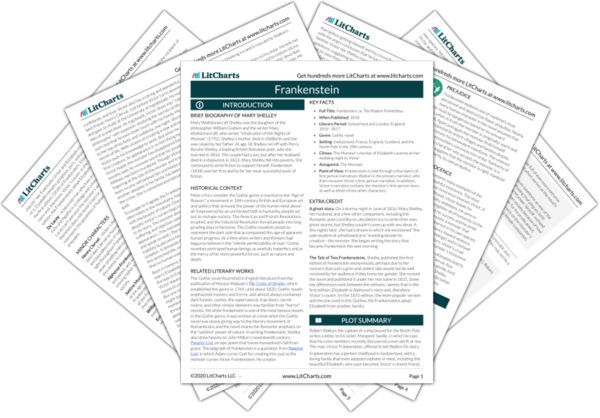Summary
Analysis
In the first entry of this three-part letter, Walton says his crew has observed a huge "savage" figure in a dogsled speeding across the ice. The next morning his crew members discover another man, this one normal sized and European, within reach of the ship.
Walton's use of the word "savage" places him alongside the many other characters in Frankenstein who prejudge the monster based on appearance alone.
Themes
Quiz
Test Yourself
The man comes aboard. Walton says he showed a "benevolence and sweetness" unequalled by anyone else he had ever met. As the days pass and the stranger recovers his strength, Walton comes to love him as a brother and considers him the friend he never thought he would meet on his voyage.
Walton loves the stranger because he is similar, and therefore offers the promise of an end to isolation. His acceptance of the stranger shows that it is Walton who is truly innocent and full of "sweetness."
Themes
Literary Devices
Quiz
Test Yourself
In the second part of the letter, Walton tells the stranger that he is on a quest for knowledge, which upsets the stranger. The stranger tells Walton that he has lost everything and is at the end of his life, yet Walton is more interested in the stranger's sensitivity to nature.
Walton holds tightly on to his innocence. He focuses on Victor's romantic love of nature rather than his warning against an ambition-fueled quest for knowledge.
Themes
Quiz
Test Yourself
In the third part of the letter, the stranger says he's decided to tell his story to either help Walton in his quest for knowledge, or convince him to give it up. He hopes that Walton might "deduce an apt moral" from hearing his tale.
Victor sees himself as a man of "experience" instructing another, "innocent" man. He clearly has something to say on the subject of ambition.
Themes
Literary Devices
Quiz
Test Yourself
Get the entire Frankenstein LitChart as a printable PDF.

Walton tells the stranger that his destiny has already been determined. Walton then promises his sister that he will take down the stranger's story in a narrative. His "notes" frame the book's main narrative, which begins in Chapter 1.
Shelley portrays Walton as a stubborn innocent fool. He chooses to ignore Victor's warnings and, believing himself to deserve achieving his ambition, trusts "fate" instead.
Themes
Quiz
Test Yourself












